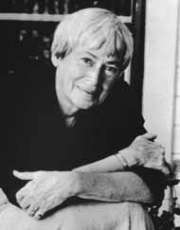|
Биография Ursula K LeGuin
Ursula Kroeber was born in 1929 in Berkeley, California, where she grew up. Her parents were the anthropologist Alfred Kroeber and the writer Theodora Kroeber, author of Ishi. She went to Radcliffe College and did graduate work at Columbia University. She married Charles A. Le Guin, a historian, in Paris in 1953; they have lived in Portland, Oregon, since 1958, and have three children and three grandchildren.
Ursula K. Le Guin writes both poetry and prose, and in various modes including realistic fiction, science fiction, fantasy, young children\'s books, books for young adults, screenplays, essays, verbal texts for musicians, and voicetexts for performance or recording. She has published six books of poetry, twenty novels, over a hundred short stories (collected in eleven volumes), four collections of essays, eleven books for children, and four volumes of translation. Few American writers have done work of such high quality in so many forms.
Several of Le Guin’s major titles have remained continuously in print for over thirty years. Her best known fantasy works, the first four Books of Earthsea, have sold millions of copies in America and England, and have been translated into sixteen languages. Her first major work of science fiction, The Left Hand of Darkness, is considered epoch-making in the field for its radical investigation of gender roles and its moral and literary complexity. Her novels The Dispossessed and Always Coming Home redefine the scope and style of utopian fiction, while the realistic stories of a small Oregon beach town in Searoad show her permanent sympathy with the ordinary griefs of ordinary people. Among her books for children, the Catwings series has become a particular favorite. Her version of Lao Tzu’s Tao Te Ching, a translation she worked on for forty years, has received high praise.
Recent or forthcoming publications include Changing Planes (Harcourt, 2003); Kalpa Imperial, by Angelica Gorodischer, translated by UKL (Small Beer Press, 2003); Selected Poems of Gabriela Mistral, translated by UKL (University of New Mexico Press, 2003); The Wave in the Mind: Talks and Essays on the Reader, the Writer, and the Imagination (Shambhala, February 2004); and Gifts, a fantasy novel, published by Harcourt in September 2004.
Three of Le Guin’s books have been finalists for the American Book Award and the Pulitzer Prize, and among the many honors her writing has received are a National Book Award, five Hugo Awards, five Nebula Awards, SFWA\'s Grand Master, the Kafka Award, a Pushcart Prize, the Howard Vursell Award of the American Academy of Arts and Letters, and the L.A. Times Robert Kirsch Award.
Le Guin has taken the risk of writing seriously and with rigorous artistic control in forms some consider sub-literary. Critical reception of her work has rewarded her courage with considerable generosity. Harold Bloom includes her among his list of classic American writers. Grace Paley, Carolyn Kizer, Gary Snyder, and John Updike have praised her work. Many critical and academic studies of Le Guin’s work have been written, including books by Elisabeth Cummins, James Bittner, B.J. Bucknall, J. De Bolt, B. Selinger, K.R. Wayne, D.R. White, and a bibliography by David S. Bratman.
Le Guin leads an intensely private life, with sporadic forays into political activism and steady participation in the literary community of her city, particularly the Library, Oregon Literary Arts, and the Soapstone Foundation. She limits her public appearances mostly to the West Coast. She has taught writing workshops from Vermont to Australia, and now teaches one or two a year in Oregon. The annual workshop, Flight of the Mind, provided the impetus for a recent book on writing narrative, Steering the Craft.
|





